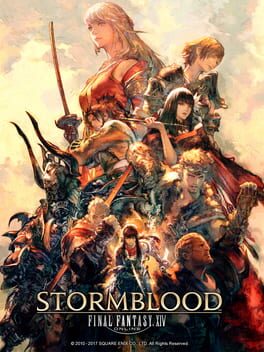In which the Warrior of Light and gang intervene in not one but TWO foreign conflicts and build a state-sponsored mineral extraction business in a vaguely Middle Eastern, war torn nation. That this somehow came out in the middle of the 2010s, with headlines about Iraq and Afghanistan fresh in our collective memory, baffles me.
I never get the impression that Final Fantasy XIV has a good grasp on its politics either in-game or in relation to the real world, but by centering Stormblood on a global conflict, it becomes so much harder to ignore how weak its storytelling is the moment things drift away from wizards and demons, and into councils and war rooms. Especially in a world where we continue to see real wars and real refugee crises, it's hard to stomach Final Fantasy XIV's sloppy facsimile. (There's a line spoken by a character who's usually presented as comic relief about how helping refugees requires a profit motive, and it's gross.)
To Stormblood's credit, things do even out when the game recenters its "light versus dark" conflict that leans more into a typical Final Fantasy tale of crystals and gods and cool anime dudes, and between the additional trials, dungeons, raids, classes and side stories, and a handful of new mechanics, Stormblood adds so much to Final Fantasy XIV as a game. Newer duties, made with more experienced players in mind, build on Final Fantasy XIV's already strong dungeon and raid experience, with Stormblood's post-game offering some of the best encounters in the whole of Final Fantasy XIV. On that front alone, Stormblood serves as maybe the strongest of the first two Final Fantasy XIV expansions, even if it's a step back when it comes to storytelling.
I never get the impression that Final Fantasy XIV has a good grasp on its politics either in-game or in relation to the real world, but by centering Stormblood on a global conflict, it becomes so much harder to ignore how weak its storytelling is the moment things drift away from wizards and demons, and into councils and war rooms. Especially in a world where we continue to see real wars and real refugee crises, it's hard to stomach Final Fantasy XIV's sloppy facsimile. (There's a line spoken by a character who's usually presented as comic relief about how helping refugees requires a profit motive, and it's gross.)
To Stormblood's credit, things do even out when the game recenters its "light versus dark" conflict that leans more into a typical Final Fantasy tale of crystals and gods and cool anime dudes, and between the additional trials, dungeons, raids, classes and side stories, and a handful of new mechanics, Stormblood adds so much to Final Fantasy XIV as a game. Newer duties, made with more experienced players in mind, build on Final Fantasy XIV's already strong dungeon and raid experience, with Stormblood's post-game offering some of the best encounters in the whole of Final Fantasy XIV. On that front alone, Stormblood serves as maybe the strongest of the first two Final Fantasy XIV expansions, even if it's a step back when it comes to storytelling.
